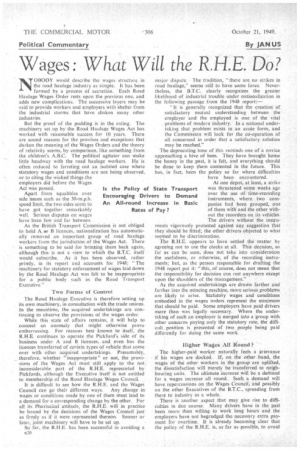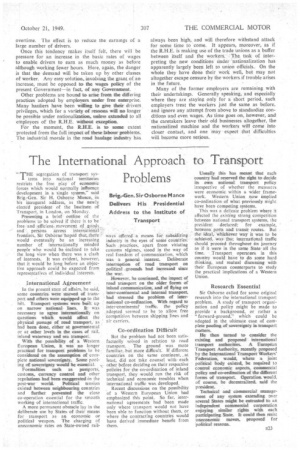Wages: What Will the R.H.E. Do?
Page 54

Page 57

If you've noticed an error in this article please click here to report it so we can fix it.
Political Commentary By JAN US
'r ° B°D Yw f llddescribe t he wages structure in he road haulage industry aisimpleithasben
formed by a process of accretion. Each Road Haulage Wages Order rests upon the previous one, and adds new complications. The successive layers may be said to provide workers and employers with shelter from the industrial storms that have shaken many other industries.
But the proof of the pudding is in the eating. The machinery set up by the Road Haulage Wages Act has worked with reasonable success for 10 years. There are sound reasons for the provisos and exceptions that darken the meaning of the Wages Orders and the theory of relativity seems, by comparison, like something from the children's A.B.C. The political agitator can make little headway with the road haulage workers. He is often reduced to ferreting out an isolated case where statutory wages and conditions are not being observed, or to citing the wicked things the employers did before the Wages Act was passed.
Apart from squabbles over side issues such as the 30-m.p.h. speed limit, the two sides seem to have got together remarkably well. Serious disputes on wages have been few and far between.
As the British Transport Commission is not obliged to hold A_ iir B licences, nationalization has automatically removed an important group of road haulage workers from the jurisdiction of the Wages Act. There is somethingto be said for bringing them back again, although this• is not a view to which the B.T.C. itself would subscribe. As it has been observed, rather primly, in its report and accounts for 1948: "The machinery for statutory enforcement of wages laid down by the Road Haulage Act was felt to be inappropriate for a public body such as the Road Transport
Executive." • Two Forms of Control
The Road Haulage Executive is .therefore setting up its own machinery, in consultation with the trade unions. In the meantime, the acquired undertakings are continuing to observe the provisions of the wages order.
While this state of affairs remains, it will help to conceal . an anomaly that might otherwise prove embarrassing. For reasons best known • to itself, the R.H.E. continues to operate the Pickford's side of its business under A and B.. licences, and even has the licences transferred of certain types of vehicle that come over with other acquired undertakings. Presumably, therefore, whether ' inappropriate" or not, the provisions of the Wages Act must still apply to the not inconsiderable part of the R.H.E. represented by Pickfords, although the Executive itself is not entitled to membership of the Road Haulage Wages Council.
It is difficult to see how the R.H.E. and the Wages
Council can go their different ways. Any change in. wages or conditions made by one of them must lead to a demand for a corresponding change by the other. For all its Pharisaical attitude, the R.H.E, will in practice be bound by the decisions of the Wages Council just as firmly as if it were represented thereon. Sooner or later, joint machinery will have to be set up.
So far, the R.H.E. has been successful in avoiding a a20 major dispute. The tradition, "there are no strikes in road haulage," seems still to have some force. Nevertheless, the B.T.C. clearly recognizes the greater likelihood of industrial trouble under nationalization in the following passage from the 1948 report:— "It is generally recognized that the creation of satisfactory mutual understanding between the employer and the employed is one of the vital . problems of modern industry. In a national under taking that problem exists in an acute form, and the Commission will look for the co-operation of all concerned in order that a satisfactory solution may be reached."
The deprecating tone of this reminds one of a novice approaching a hive of bees. They have brought home the honey in the .past, it is felt, and everything should be done to keep them contented in the future. This has, in fact, been the policy so far where difficulties have been encountered.
At one depot, at least, a strike was threatened some weeks ago over the use of time-recording instruments, where two companies had been grouped, one of them with and the other Without the recorders on its vehicles. The drivers without the instruments vigorously protested against any suggestion that they should be fitted; the other-drivers objected to what seemed to be discrimination.
The R.H.E. appears to have settled the matter by agreeing not to use the clocks at all. This decision, so far as can be seen, does not 'take into consideration the usefulness, or otherwise, of the recording instruments; but, as the person responsible for drafting the 1.948 report put it: "this, of course, does not mean that the responsibility for decision can rest anywhere except
upon the-shoulders of the management." •
As the acquired undertakings are draWn farther and farther into the mincing machine, more serious problems are likely to arise. Statiddry wages and conditions embodied in the wages Orders represent the minimum that should be paid. Some employers have paid drivers more than was legally necessary. Where the undertaking of such an employer is merged into a group with. other concerns paying only the statutory rate, the difficult position is presented of two people being paid differently for doing the same work. .
Higher Wages All !found?
The higher-paid worker naturally feels a grievance if his wages. are docked, if, on the other hand, the wages of the other workers in the group are uplifted, the dissatisfaction will merely be transferred to neighbouring units. The ultimate increase: will be a dernand for a wages increase all round. Such. a demand will have repercussions on the Wages Council, and possibly on the other Executives of the B.T.C., spreading from there to industry as a whole.
There is another aspect that may give rise to difficulties in due course. Many drivers have in the past been more than willing to work long hours and the employers have not begrudged the •necessary extra payment for overtime. It is already becoming clear that the policy of the R.H.E. is, as far as .possible, to avoid overtime. The effect is to reduce the earnings of a large number of drivers.
Once this tendency makes itself felt, there will be pressure for an increase in the basic rates of wages to enable drivers to earn as much money as before although working fewer hours. Here, again, the danger is that the demand will be taken up by other classes of worker. Any easy solution,. involving the want of an increase, must be opposed to the wages porky of the present Government—in fack of any. Govenroinest. Other problems are bound to arise front thediffering practices adopted by emptayetx under fee eaterprise. Many hauliers have been wilting to gilte their drivers privileges, which for a variety of reasons, wilt reo longer be possible under nationalization, unless extended to all
employees of the R.H.E. withoutexception o _ employees of the R.H.E. withoutexception o _
FOr the moment, the RILE_ is to some extent protected from the full impact of these labour problems. The industrial morale in the rood haulage industry has
always been high, and will therefore withstand attack for some time to come. It appears, moreover, as if the R.H.E. is making use of the trade unions as a buffer between itself and the workers. : The task of interpreting the new conditions under nationalization has apparently largely been left to union officials.. On the whole they have done their work well, but may not altogether escape censure by the workers if trouble arises in the future.
Many of the former employers are remaining with their undertakings. Generally speaking, and especially where they are staying only for a short period, such employers treat the workers just the same as before, and ignore any attempt from above to standardize conditions and even wages. As time goes on, however, and the caretakers leave their old businesses altogether, the nationalized machine and the workers will come into closer contact, and one may expect that difficulties will become more serious,




























































































